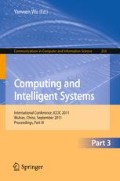Abstract
Based on the research of knowledge management and knowledge flow this paper take the factors which influences the flow of knowledge among the enterprises as the mainly research objects. It uses the Knowledge Absorptive Capacity, Knowledge Matching Degree, Industry Openness Degree as the total input, Knowledge Flow Effects as the total output. Using survey data for example design, and using Rough Sets Theory method calculating and analysis the data. Through the upper approximation and lower approximation describing the relationship between the totle input and knowledge flow effects. Then provide a meaningful guidance for knowledge flow smoothly in the supply chain, enhancing the overall knowledge ability ,and improve efficiency and knowledge ultimately benefit.
Access this chapter
Tax calculation will be finalised at checkout
Purchases are for personal use only
Preview
Unable to display preview. Download preview PDF.
References
Jian, L.: The Method and Application of Heterozygous Rough Sets Facing Uncertainty Decision, pp. 5–11. Science Press, Beijing (2008)
An, X., Zhang, X., Zhang, H.: The Model and Effect Elements OF Knowledge Flows of Supply Chain Research. Science and Technology Management Research (1) (2009)
Zhang, H.: Research on Knowledge Sharing Mechanisms in Supply Chain Enterprises Basis on Knowledge Market. Technological Economy Management Department, ChongQing University (2007)
Zhang, W., Wu, W., Liang, J., Li, D.: Rough Sets Theroy Methods, pp. 28–33. Science Press, Beijing (2001)
Rose, D.F.: Through supply chain management. Chapman & Hall, Boca Raton (1998)
Lee, H.L., Billington, C.: The evolution of supply chain management models and practices at Hewlett-Packard. Interfacts 25(5), 42–63 (1995)
Spender, J.C.: Tacit Knowledge in Organizations. Academy of Management. Mississippi: The Academy of Management Review 25(2) (2000)
Mikhailov, L.: Deriving priorities from fuzzy pair wise comparison judgements. Fuzzy Setsand Systems 134, 365–385 (2003)
Lin, T.Y.: Topological and Fuzzy Rough Sets,Intelligent Decision Support, pp. 287–304. Kluwer Academic Publishers, Dordrecht (1992)
Miyamoto, S.: Application of rough sets to information retrieval. Journal of the American Society for Information
Author information
Authors and Affiliations
Editor information
Editors and Affiliations
Rights and permissions
Copyright information
© 2011 Springer-Verlag Berlin Heidelberg
About this paper
Cite this paper
Zhang, W., Xu, Z. (2011). The Identification of Knowledge Flow Influence Factors of Enterprises Based on Rough Sets. In: Wu, Y. (eds) Computing and Intelligent Systems. ICCIC 2011. Communications in Computer and Information Science, vol 233. Springer, Berlin, Heidelberg. https://doi.org/10.1007/978-3-642-24010-2_9
Download citation
DOI: https://doi.org/10.1007/978-3-642-24010-2_9
Publisher Name: Springer, Berlin, Heidelberg
Print ISBN: 978-3-642-24009-6
Online ISBN: 978-3-642-24010-2
eBook Packages: Computer ScienceComputer Science (R0)

